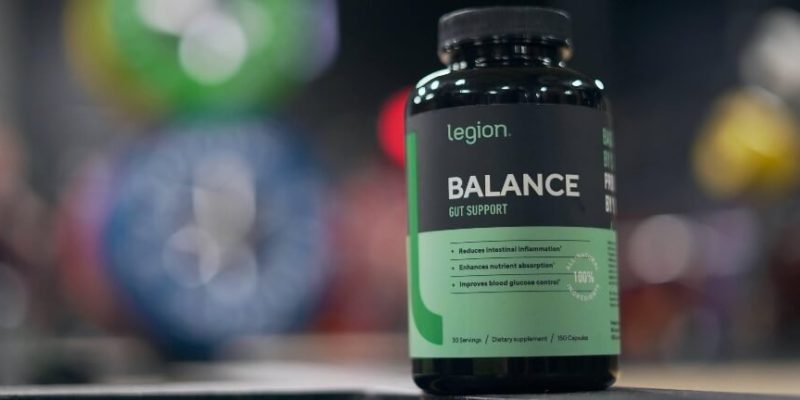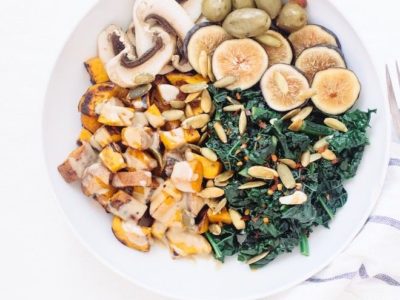
Hippocrates, the ancient Greek physician and “Father of Modern Medicine,” once said that all disease starts in the gut.
Although not entirely true, it was a perceptive observation—when gut health is compromised, the risk of disease and disorder rises markedly.
This is because the “gut” is a lot more than just the stomach. It’s your entire digestive system, including your mouth and teeth, esophagus, stomach, and small and large intestines.
You can think of the gut as a long assembly line, with each section performing a separate job, and because of its complexity, there are many ways for it to influence your health and well-being.
In fact, it’s not a stretch to say that the state of your gut will determine much of the quality of your life.
For instance, scientists have discovered that a healthy bacterial landscape in the gut (microbiome) is an important defense mechanism against obesity; many gastrointestinal diseases, such as inflammatory bowel syndrome (IBS) and disease (IBD); mood disorder, brain dysfunction, stress, anxiety, depression, and even autism.
That’s why we created Balance.
It’s a 100% natural gut health supplement that reduces intestinal inflammation, enhances nutrient absorption, and improves insulin sensitivity and blood glucose control.
That is, Balance improves your body’s ability to process and use the food you eat, and this can reduce bloating and gassiness, increase energy and vitality, and support the metabolism.
Balance isn’t just for people with unhealthy diets or lifestyles or digestive disorders—everyone can benefit from it, no matter how well they eat, live, and feel.
The reason it’s so effective is simple:
Every ingredient is backed by peer-reviewed scientific research and is included at clinically effective levels.
That means the ingredients and doses in Balance are based on published scientific research demonstrating real benefits, not the restrictions of razor-thin production budgets or gluttonous profit margins.
In other words, we don’t just claim to have the best gut health supplement on the market—we back it up with real science and real numbers.
Let’s dive into the science behind the formulation.
Balance Ingredient #1: Berberine
Berberine is a compound found in several plants, including a group of shrubs called Berberis.
It’s long been used in Traditional Chinese Medicine to treat various ailments, including diarrhea, cholera, and other digestive disorders, as well as feelings of fatigue and infirmity.
Research shows that supplementation with berberine . . .
- Reduces intestinal inflammation, which eases discomfort and may enhance nutrient absorption
- Prevents infections and protects against medical conditions that cause diarrhea, such as Irritable Bowel Syndrome (IBS)
- Improves blood glucose control, which can enhance energy levels, appetite control, and cognition, as well as reduce the risk of type 2 diabetes and heart attack
- May enhance the function of healthful gut bacteria
While many people think of berberine as primarily helpful for controlling blood sugar (and it is), the reason we included berberine in Balance is due to its potent effects on gut health, especially when it comes to fighting gut-based illnesses.
For example, studies on mice show that berberine can prevent E. coli bacteria from causing the intestines to secrete water (which often leads to diarrhea). Research also shows that berberine effectively suppresses colitis—a kind of inflammatory bowel disease—in rats.
The clinically effective dose of berberine is between 900 and 1,500 mg, and Balance contains 1,500 mg of berberine per serving.
Summary: Berberine is a plant-based compound that reduces intestinal inflammation, fights infections, helps reduce the symptoms of intestinal illnesses, and improves blood sugar control. Balance contains a clinically effective dose of 1,500 mg of berberine per serving.
Balance Ingredient #2: Artichoke Leaf Extract
Artichoke leaf extract is a substance derived from the ground-up leaves of the edible flower heads of the artichoke plant.
It contains molecules known as caffeoylquinic acid and cynaropicrin, and research shows the former is an effective antioxidant, and the latter increases bile acid secretion from liver cells and relaxes the small intestine.
This is why studies show that supplementation with artichoke leaf extract aids in the digestion of fatty acids and can alleviate dysfunctional dyspepsia in the small intestine.
Additionally, research shows that artichoke leaf extract can improve blood glucose control in people genetically predisposed to high blood glucose levels (people of Polynesian and Native American descent, for instance).
The clinically effective dose of artichoke leaf extract is 1,800 mg, and Balance contains 1,800 mg of artichoke leaf extract per serving.
Summary: Artichoke leaf extract contains two molecules that protect the digestive system from oxidative stress, improve the digestion of fatty acids, relax the intestines, and improve blood sugar control. Balance contains a clinically effective dose of 1,800 mg of artichoke leaf extract per serving.
Balance Ingredient #3: Bromelain
Bromelain is an enzyme found in pineapple that helps with the digestion of protein.
By improving your body’s ability to digest protein, you can enhance the absorption of amino acids and reduce digestive distress and flatulence resulting from malabsorption.
The clinically effective dose of bromelain is unknown, but the standard protocol is approximately 50 GDU (Gelatin Digesting Unit, which is a measure of enzyme potency) per meal, and Balance contains 150 GDU of bromelain per serving.
This is higher than the per-meal dose because we intend for people to take one serving of Balance per day spread evenly between at least three meals (basically, you get one dose of bromelain every time you take ⅓ of a dose of Balance).
Summary: Bromelain is an enzyme found in pineapple that helps with the digestion of protein, and thus improves your ability to absorb amino acids and reduces the risk of malabsorption and digestive distress. Balance contains an effective dose of 150 GDU of bromelain per serving.
Balance Ingredient #4: Pepsin
Pepsin is an enzyme found in the stomach that helps with the digestion of protein.
By improving your body’s ability to digest protein, you can enhance the absorption of amino acids and reduce digestive distress and flatulence resulting from malabsorption.
In other words, it does much the same job as bromelain. Why take both, you wonder?
Both enzymes complement one another: Bromelain is better for breaking down some kinds of protein, and pepsin is better for breaking down other kinds.
The clinically effective dose of pepsin is unknown, but the standard protocol is approximately 150,000 FCC (Food Chemical Codex, which is a measure of enzyme potency) per meal, and Balance contains 500,000 FCC of pepsin per serving.
This is higher than the per-meal dose because we intend for people to take one serving of Balance per day spread evenly between at least three meals.
Summary: Pepsin is an enzyme that helps the body digest protein in much the same way as bromelain, which is why the two enzymes are usually taken together. Balance contains an effective dose of 500,000 FCC of pepsin per serving.
Balance Ingredient #5: Papain
Papain is an enzyme found in papaya that also helps with the digestion of protein.
Thus, it improves digestion the same way bromelain and pepsin do: by improving your body’s ability to break down protein and absorb amino acids, thus reducing the risk of malabsorption and resulting flatulence and digestive distress.
The clinically effective dose of papain is unknown, but the standard protocol is approximately 30,000 PU (Papain Unit, which is a measure of enzyme potency) per meal, and Balance contains 100,000 PU of papain per serving.
This is higher than the per-meal dose because we intend for people to take one serving of Balance per day spread evenly between at least three meals.
Summary: Papain is an enzyme found in papaya that helps the body digest protein in much the same way as bromelain and papain, which is why these three enzymes are often taken together. Balance contains an effective dose of 100,000 PU per serving.
The Bottom Line on Balance
Balance is a 100% natural gut health supplement that reduces intestinal inflammation, enhances nutrient absorption, and improves insulin sensitivity and blood glucose control.
It achieves these benefits thanks to clinically effective doses of four key ingredients:
- Berberine, a plant-based compound that reduces intestinal inflammation, fights infections, helps reduce the symptoms of intestinal illnesses, and improves blood sugar control.
- Artichoke leaf extract, which protects the digestive system from oxidative stress, improves the digestion of fatty acids, relaxes the intestines, and improves blood sugar control.
- Bromelain, an enzyme found in pineapple that helps with the digestion of protein, and thus improves your ability to absorb amino acids and reduces the risk of malabsorption and digestive distress.
- Pepsin, an enzyme that helps the body digest protein in much the same way as bromelain.
- Papain, another enzyme that helps the body digest protein in much the same way as bromelain and pepsin.
So, if you want a healthy and functional gut that supports your mental and physical well-being and protects against disease and dysfunction, you want to try Balance today.
What’s more, Balance isn’t just for people with unhealthy diets or lifestyles or digestive disorders—everyone can benefit from it, no matter how well they eat, live, and feel.
Get your bottle today and see for yourself how Balance can reduce bloating and gassiness, increase energy and vitality, and support your metabolism.
+ Scientific References
- Mazorra-Manzano, M. A., Ramírez-Suarez, J. C., & Yada, R. Y. (2018). Plant proteases for bioactive peptides release: A review. In Critical Reviews in Food Science and Nutrition (Vol. 58, Issue 13, pp. 2147–2163). Taylor and Francis Inc. https://doi.org/10.1080/10408398.2017.1308312
- Rajiv Heda, Fadi Toro, & Claudio R. Tombazzi. (n.d.). Physiology, Pepsin – PubMed. Retrieved November 24, 2020, from https://pubmed.ncbi.nlm.nih.gov/30725690/
- Şimşek, Z., Altinbaş, A., Delibaşi, T., & Yüksel, O. (2013). Incomplete stomach emptying as a complication of intragastric balloon treatment and a solution suggestion: Pineapple juice drinking. Turkish Journal of Gastroenterology, 24(4), 330–333. https://doi.org/10.4318/tjg.2013.0739
- Rezazadeh, K., Rahmati-Yamchi, M., Mohammadnejad, L., Ebrahimi-Mameghani, M., & Delazar, A. (2018). Effects of artichoke leaf extract supplementation on metabolic parameters in women with metabolic syndrome: Influence of TCF7L2-rs7903146 and FTO-rs9939609 polymorphisms. Phytotherapy Research, 32(1), 84–93. https://doi.org/10.1002/ptr.5951
- Ebrahimi-Mameghani, M., Asghari-Jafarabadi, M., & Rezazadeh, K. (2018). TCF7L2-rs7903146 polymorphism modulates the effect of artichoke leaf extract supplementation on insulin resistance in metabolic syndrome: a randomized, double-blind, placebo-controlled trial. Journal of Integrative Medicine, 16(5), 329–334. https://doi.org/10.1016/j.joim.2018.05.006
- Holtmann, G., Adam, B., Haag, S., Collet, W., Grünewald, E., & Windeck, T. (2003). Efficacy of artichoke leaf extract in the treatment of patients with functional dyspepsia: A six-week placebo-controlled, double-blind, multicentre trial. Alimentary Pharmacology and Therapeutics, 18(11–12), 1099–1105. https://doi.org/10.1046/j.1365-2036.2003.01767.x
- Emendörfer, F., Emendörfer, F., Bellato, F., Noldin, V. F., Cechinel-Filho, V., Yunes, R. A., Delle Monache, F., & Cardozo, A. M. (2005). Antispasmodic activity of fractions and cynaropicrin from Cynara scolymus on guinea-pig ileum. Biological and Pharmaceutical Bulletin, 28(5), 902–904. https://doi.org/10.1248/bpb.28.902
- Kirchhoff, R., Beckers, C., Kirchhoff, G. M., Trinczek-Gärtner, H., Petrowicz, O., & Reimann, H. J. (1994). Increase in choleresis by means of artichoke extract. Phytomedicine, 1(2), 107–115. https://doi.org/10.1016/S0944-7113(11)80027-9
- Gebhardt, R., & Fausel, M. (1997). Antioxidant and hepatoprotective effects of artichoke extracts and constituents in cultured rat hepatocytes. Toxicology in Vitro, 11(5), 669–672. https://doi.org/10.1016/S0887-2333(97)00078-7
- Olennikov, D. N., Kashchenko, N. I., Chirikova, N. K., Vasil’Eva, A. G., Gadimli, A. I., Isaev, J. I., & Vennos, C. (2019). Caffeoylquinic acids and flavonoids of fringed sagewort (Artemisia frigidawilld.): HPLC-DAD-ESI-QQQ-MS profile, HPLC-DAD quantification, in vitro digestion stability, and antioxidant capacity. Antioxidants, 8(8). https://doi.org/10.3390/antiox8080307
- Zhang, M., Long, Y., Sun, Y., Wang, Y., Li, Q., Wu, H., Guo, Z., Li, Y., Niu, Y., Li, C., Liu, L., & Mei, Q. (2011). Evidence for the complementary and synergistic effects of the three-alkaloid combination regimen containing berberine, hypaconitine and skimmianine on the ulcerative colitis rats induced by trinitrobenzene-sulfonic acid. European Journal of Pharmacology, 651(1–3), 187–196. https://doi.org/10.1016/j.ejphar.2010.10.030
- H Zhou, & S Mineshita. (n.d.). The effect of berberine chloride on experimental colitis in rats in vivo and in vitro – PubMed. Retrieved November 24, 2020, from https://pubmed.ncbi.nlm.nih.gov/10945829/
- Hong, T., Yang, Z., Lv, C. F., & Zhang, Y. (2012). Suppressive effect of berberine on experimental dextran sulfate sodium-induced colitis. Immunopharmacology and Immunotoxicology, 34(3), 391–397. https://doi.org/10.3109/08923973.2011.609887
- Sack, R. B., & Froehlich, J. L. (1982). Berberine inhibits intestinal secretory response of Vibrio cholerae and Escherichia coli enterotoxins. Infection and Immunity, 35(2), 471–475. https://doi.org/10.1128/iai.35.2.471-475.1982
- Dong, H., Wang, N., Zhao, L., & Lu, F. (2012). Berberine in the treatment of type 2 diabetes mellitus: A systemic review and meta-analysis. In Evidence-based Complementary and Alternative Medicine (Vol. 2012). Evid Based Complement Alternat Med. https://doi.org/10.1155/2012/591654
- Zhang, X., Zhao, Y., Zhang, M., Pang, X., Xu, J., Kang, C., Li, M., Zhang, C., Zhang, Z., Zhang, Y., Li, X., Ning, G., & Zhao, L. (2012). Structural changes of gut microbiota during berberine-mediated prevention of obesity and insulin resistance in high-fat diet-fed rats. PLoS ONE, 7(8). https://doi.org/10.1371/journal.pone.0042529
- Li, S., Wang, N., Tan, H., Chueng, F., Zhang, Z., Yuen, M., & Feng, Y. (2020). Modulation of gut microbiota mediates berberine‐induced expansion of immuno‐suppressive cells to against alcoholic liver disease. Clinical and Translational Medicine, 10(4). https://doi.org/10.1002/ctm2.112
- Zhang, H., Wei, J., Xue, R., Wu, J. D., Zhao, W., Wang, Z. Z., Wang, S. K., Zhou, Z. X., Song, D. Q., Wang, Y. M., Pan, H. N., Kong, W. J., & Jiang, J. D. (2010). Berberine lowers blood glucose in type 2 diabetes mellitus patients through increasing insulin receptor expression. Metabolism: Clinical and Experimental, 59(2), 285–292. https://doi.org/10.1016/j.metabol.2009.07.029
- Zhang, Y., Li, X., Zou, D., Liu, W., Yang, J., Zhu, N., Huo, L., Wang, M., Hong, J., Wu, P., Ren, G., & Ning, G. (2008). Treatment of type 2 diabetes and dyslipidemia with the natural plant alkaloid berberine. Journal of Clinical Endocrinology and Metabolism, 93(7), 2559–2565. https://doi.org/10.1210/jc.2007-2404
- Chen, C., Tao, C., Liu, Z., Lu, M., Pan, Q., Zheng, L., Li, Q., Song, Z., & Fichna, J. (2015). A Randomized Clinical Trial of Berberine Hydrochloride in Patients with Diarrhea-Predominant Irritable Bowel Syndrome. Phytotherapy Research, 29(11), 1822–1827. https://doi.org/10.1002/ptr.5475
- Rabbani, G. H., Butler, T., Knight, J., Sanyal, S. C., & Alam, K. (1987). Randomized Controlled Trial of Berberine Sulfate Therapy for Diarrhea Due to Enterotoxigenic Escherichia Coli and Vibrio Cholerae. Journal of Infectious Diseases, 155(5), 979–984. https://doi.org/10.1093/infdis/155.5.979
- Maung, K., Khin, M., Yunt-Wai, N. N., Kyaw, A., & Tin, T. U. (1985). Clinical trial of berberine in acute watery diarrhoea. British Medical Journal (Clinical Research Ed.), 291(6509), 1601–1605. https://doi.org/10.1136/bmj.291.6509.1601
- Yu, Z. C., Cen, Y. X., Wu, B. H., Wei, C., Xiong, F., Li, D. F., Liu, T. T., Luo, M. H., Guo, L. L., Li, Y. X., Wang, L. S., Wang, J. Y., & Yao, J. (2019). Berberine prevents stress-induced gut inflammation and visceral hypersensitivity and reduces intestinal motility in rats. World Journal of Gastroenterology, 25(29), 3956–3971. https://doi.org/10.3748/wjg.v25.i29.3956
If you enjoyed this article, get weekly updates. It’s free.
Sending…
Great! You’re subscribed.
100% Privacy. We don’t rent or share our email lists.





